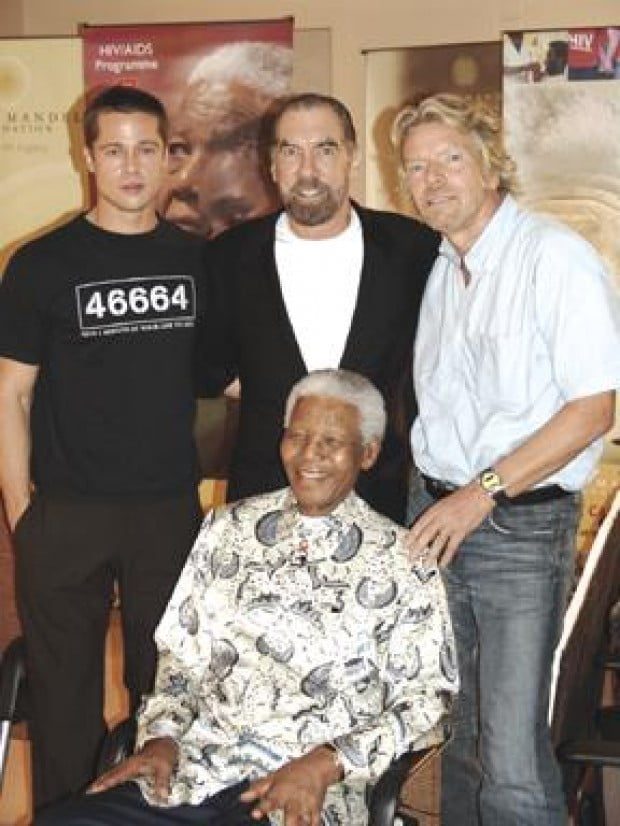
Local residents Brad Pitt and John Paul DeJoria join a foundation that seeks to rid the earth of landmines-starting with Mozambique.
By Melonie Magruder / Special to The Malibu Times
Mozambique is a country in southeast Africa a little larger than Texas whose economy has been ravaged by years of AIDS and civil war. It has a population of about 19 million, who mostly survive on small-scale farming, but almost 90 percent of Mozambique’s arable land is still uncultivated. That is because Mozambique also has about one million unexploded landmines scattered silently and lethally around the country.
Landmines are the deadly remnants of civil war and it is estimated that there are more than 100 million lying just beneath the surface of our planet worldwide. They are not designed to kill, necessarily, but to blow off the legs of its victims, and Mozambique’s population is rife with scarred and twisted stumps.
In many African countries, landmines have a devastating domino effect on their struggling economies. Victims of landmines are rendered incapable of self-support and the terror of unexploded mines renders the rest of the population unwilling to cultivate perfectly farmable land. Economic and social progress is paralyzed.
Into this breach of stagnation has stepped a group of innovative and passionate advocates called the Mineseekers, founded by Michael Kendrick. Their project: The Sole of Africa. Headed by patrons Nelson Mandela and his wife, Graca Machel, Queen Noor of Jordan, British entrepreneur Sir Richard Branson and Malibu residents John Paul DeJoria and Brad Pitt, the Mineseeker Foundation aims to return farmland to the citizens of Mozambique and encourage economic growth and sustainability.
“Landmines kill or maim somebody every 19 minutes,” said Charlie Gay, executive director of the Mineseeker Foundation. “These countries are in peril. We want to empower these citizens to reclaim their land without fear and look forward to a future of purpose and dignity.”
Until recently, it would cost agencies up to $1,000 to remove or disable a single landmine in a slow, inefficient process that would require 600 years to eliminate them completely from the world. Mineseekers has developed a breakthrough technology that can detect the positions of mines by using ground-penetrating radar, mounted on the stable platform of an airship, in the form of a blimp, which scans the ground at more than 100 yards per second.
“Just as important as finding landmines is finding land where there aren’t any mines,” Gay said.
DeJoria, founder of the hugely successful John Paul Mitchell Systems hair care products, has plunged wholeheartedly into the rescue of Mozambique with Mineseekers.
“I worked with the Rotary Club of South Africa to go in and fit people there with prostheses,” DeJoria said. “Suddenly, people who had been reduced to begging have a future. It’s amazing!”
DeJoria is a firm believer that the blessings of his rags-to-riches career obligate him to give generously of his time and resources.
“Success without charity is failure,” he said.
“Using the radar-mounted blimp, we can map fields that people won’t step foot in for fear of landmines,” DeJoria explained. “Not only does this save villages from having to care for another generation of legless and armless people, we’ve recovered land for them that will provide food and commerce.”
With the new technology, DeJoria added, the cost of removing landmines drops down to about three dollars apiece.
Gay is effusive in his praise for DeJoria and the Mineseeker team.
“These are uncommon people united by common cause,” he said. “And the people of Mozambique are astonishing, ethical citizens. Micro-loan programs there see 100 percent repayment. Helping these people to jump-start agrarian reform will bring prosperity to a region that is desperate for help.”
The Sole of Africa program will expand into Angola next, Gay explained, and they have formed cooperative alliances with corporations and community leaders from a dozen countries to raise awareness of, and funds for, the project.
“We have a three-year road map,” Gay said. “The first step is with aid, the second is with land return and the third is to achieve education and self-sustainability. Poverty cannot be erased overnight, and foreign aid and debt reduction are not the only answers. We must offer education and empowerment.”
Actor Pitt has spent a great deal of time in Africa lately and plumbs his celebrity status to spread the news on the Mineseeker’s efforts.
“I am honored to have the opportunity to stand shoulder-to-shoulder with my esteemed patrons in their quest to rid the world of landmines and welcome the challenge,” Pitt said in a prepared statement.
DeJoria acknowledged that the scope of the project was huge.
“There are 72 countries in the world that need landmine removal,” he said. “But we are putting our foot down here and now. That’s why we are called the Sole of Africa.”
More information on the Mineseeker Foundation’s Sole of Africa project can be obtained by visiting the Web site www.thesoleofafrica.org
